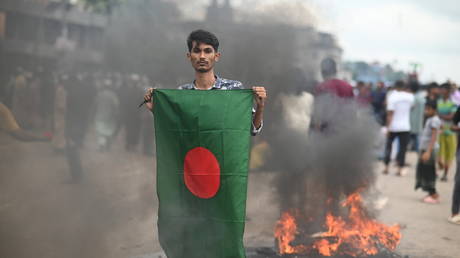Bangladesh is a Mess
Bangladesh is currently facing multiple challenges, from natural disasters and economic pressures to political unrest and social issues.
Over the weekend, the country has been facing significant unrest due to widespread student-led protests against government job quotas. The quotas, reintroduced after being scrapped in 2018, reserved 30% of civil service jobs for veterans and their relatives, sparking anger among students who viewed them as unfair, especially during economic decline.
On Saturday, soldiers patrolled the deserted streets of Dhaka, the capital of Bangladesh, as the government ordered a two-day shutdown of all offices and institutions following the deaths of at least 114 people during the protests. Sporadic clashes continued, resulting in at least four additional deaths. Security forces enforced a curfew with roadblocks.
Prime Minister Sheikh Hasina’s government declared Sunday and Monday as “public holidays,” allowing only emergency services to operate. The country remained under curfew on Monday, while internet and text message services were suspended nationwide since Thursday night.
In response to the protests, Bangladesh’s top court scaled back the job quotas that had incited the violence. The supreme court overturned a ruling that had reinstated quotas for all civil service jobs. Now, only 5% of jobs will be reserved for descendants of freedom fighters and another 2% for ethnic minorities or people with disabilities. The remaining positions will be open to candidates based on merit.
Thankfully the return of the quotas led to peaceful demonstrations on university campuses across the country. Students mobilized through social media to demand an end to the quotas, arguing they were unjust and favored those in the ruling Awami League party.
However, the unrest turned violent as pro-government groups allegedly attacked protesters, and riot police used rubber bullets and tear gas to disperse crowds.
The situation in Bangladesh remains tense as the government and security forces continue to enforce strict measures to control the unrest. The reduction of the job quotas by the supreme court may address some grievances, but the broader issues of economic decline and political favoritism continue to fuel discontent among the population.
UN Human Rights Chief Volker Türk called for accountability and dialogue, saying he is “deeply concerned by this week’s violence in Bangladesh.”
He said the attacks on student protesters “are particularly shocking and unacceptable” and called for “impartial, prompt and exhaustive investigations into these attacks, and those responsible held to account.”
He urged all sides to “exercise restraint” and called on the security forces “to ensure that any use of force is strictly in line with the requirements of international human rights law.”
Expressing his concern over reports about the deployment of paramilitary police units such as the Border Guard Bangladesh and the Rapid Action Battalion, which he said have long track records of violations, Türk said the Government should take the necessary measures “to ensure the protection and safety of the students participating in peaceful protests, and to guarantee the right to freedom of assembly and expression without fear of attacks against their lives and physical integrity, or other forms of repression.”
He insisted that Bangladesh’s political leaders “must work with the country’s young population to find solutions to the ongoing challenges and focus on the country’s growth and development.”
Türk said he is concerned over the shutting down of the Internet “as it disproportionately restricts the enjoyment of the right to freedom of expression, including freedom to seek, receive and impart information – particularly in the midst of a crisis.”
He urged authorities to restore Internet access “without further delay.”
In addition to the ongoing protests over government job quotas, Bangladesh is currently dealing with several significant events and challenges.
Heavy monsoon rains have caused severe flooding in northeastern Bangladesh, affecting around 1.4 million people, particularly in the Sylhet and Sunamganj districts. The UN World Food Programme is providing vital assistance, including fortified biscuits and cash aid, to help the affected families meet their essential needs.
As WFP notes, Bangladesh has also been dealing with a massive influx of Rohingya refugees from Myanmar since 2017.
The country is experiencing economic strains, with certain banks nearing critical financial conditions, and access to healthcare remains a crucial issue.
If Bangladesh’s citizens hope for a reprieve from their troubles, they may find it, at least temporarily, in the country’s upcoming Independence Day celebrations.
With the King of Bhutan set to visit Bangladesh to attend the occasion, this may be the right moment for Bangladesh’s citizens to find a common cause and call for unity.
As Türk said, “Dialogue is the best and only way forward.”
Image: X
Become a Patron!
Or support us at SubscribeStar
Donate cryptocurrency HERE
Subscribe to Activist Post for truth, peace, and freedom news. Follow us on Telegram, HIVE, Minds, MeWe, Twitter – X, Gab, and What Really Happened.
Provide, Protect and Profit from what’s coming! Get a free issue of Counter Markets today.




